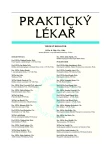Some special questions dealing with the institution of advance directives
Authors:
J. Matějek
Authors‘ workplace:
Univerzity Hradec Králové.
; Vedoucí pracoviště: PhDr. Tomáš Petráček, Ph. D., Th. D.
; Katedra kulturních a náboženských studií Pedagogické fakulty
Published in:
Prakt. Lék. 2010; 90(10): 602-606
Category:
Of different specialties
Overview
This article is focused on the institution of advance directives of patients as a part of the Czech legal system. It deals with the scientific notion of disease and its consequences for the solutions of some issues emerging in relation to this tool. The pattern of disease in natural sciences is also common in biomedicine – applied human biology. The consequences resulting from this approach are also reflected in the solutions of some important problems. That is predominantly the issue of the biomedicine consulting in connection with advance directives of patients. The significance of the most possible patient’s addressee concretization and the extent of biomedicine consulting are pursued, i.e. what the patient should know about his/her disease from the biomedical point of view. The scientific point of view reflects the requirement for the most accurate wording of the patient’s declaration and the requirement for fidelity of his/her interpretation.
Key words:
Advance directives, disease, interpretation of the text.
Sources
Knihy:
1. Atkinson, P. The clinical experience: the construction and reconstruction of medical reality, Aldershot: Ashgate, 1997. ISBN: 1-85628-577-4. 214 s.
2. Putz, W., Steldinger, B. Patientenrechte am Ende des Lebens. Vorsorgevollmacht. Patientenverfügung. Selbstbestimmtes Sterben. 3. vyd. München. Deutscher Taschenbuch Verlag, 2007, ISBN 3-42305-696-7. 288 s.
3. Reich, W., T. (ed.) Encyclopedia of Bioethics, 2. vydání. New York: Simon & Schuster Macmillan, 1995, ISBN: 0-02897-353-4.
Časopisy:
1. Anonym. Therapieabbruch nach nicht gewollten Reanimation. Eine Kasuistik zur Problematik von Patientenverfügungen. Ethik in der Medizin 2003, 2, s. 109-113.
2. Bauer A. Grenzen der Selbstbestimmung am Lebensende: Die Patientenverfügung als Patentlösung. Zeitschrift für medizinische Ethik 2009, 2, s. 169-182.
3. May, A.T., Niewohner, S., Bickhardt, J. et al. Standards für die Beratung zu Patientenverfügungen. Ethik in der Medizin 2005. 4, s. 332-336.
4. Merkel. R. Zur Frage der Verbindlichkeit. Ethik in der Medizin 2004, 3, s. 298-307.
5. Praxmarer, V., Lahrmann, H. Amyotrophe Lateralsklerose - wenn die Plannung zu spät kommt. Wiener Medizinische Wochenschrift 2006,10, s. 297-301.
6. Rich A. Defining and Delineating a Duty to Prognosticate. Theoretical Medicine and Bioethics 2001, 3, p. 177-192 s.
Webové zdroje:
1. Deutscher Bundestag. Zwischenbericht der Enquete-Kommission Ethik und Recht der modernen Medizin. Patientenverfügungen, [on line], [cit. 17. 3. 2010], dostupný z: http://webarchiv.bundestag.de/cgi/show.php?fileToLoad=116&id=104.
2. Ministerstvo zdravotnictví ČR. Věcný záměr zákona o zdravotních službách a podmínkách jejich poskytování, [on line], [cit. 5. 1. 2010], dostupný z:http://www.mzcr.cz/Odbornik/Pages/279-vecny-zamer-zakona-o-zdravotnich-sluzbach-a-podminkach-jejich-poskytovani.html.
3. Parlamentní shromáždění Rady Evropy. Úmluva o lidských právech a biomedicíně, [on line], [cit. 13. 1. 2010], dostupný z: http://juristic.zcu.cz/ dostal/docs/UB_cj.htm.
Labels
General practitioner for children and adolescents General practitioner for adultsArticle was published in
General Practitioner

2010 Issue 10
- Advances in the Treatment of Myasthenia Gravis on the Horizon
- Hope Awakens with Early Diagnosis of Parkinson's Disease Based on Skin Odor
- Memantine in Dementia Therapy – Current Findings and Possible Future Applications
- Memantine Eases Daily Life for Patients and Caregivers
- Possibilities of Using Metamizole in the Treatment of Acute Primary Headaches
-
All articles in this issue
- Burn-out syndrome in physicians
- Measuring the quality of life of family caregivers
- Some special questions dealing with the institution of advance directives
- Professional satisfaction of physicians and nurses in general practice settings
- Alcohol consumption and its situation in the Czech Republic
- Adrenal carcinoma – pitfalls of diagnosis
- Current review of the diagnosis and treatment of pancreatic cancer
-
Evolution and evolutionary theory for physicians
X.: Self-awareness. - Continuing postgraduate education of general practitioners and E-learning in the Czech Republic
-
What should a general practitioner know about drinking water?
Part II. Health risks associated with water - Dyspnoea in elderly subjects caused by respiratory diseases
- General Practitioner
- Journal archive
- Current issue
- About the journal
Most read in this issue
- Dyspnoea in elderly subjects caused by respiratory diseases
- Burn-out syndrome in physicians
- Current review of the diagnosis and treatment of pancreatic cancer
- Continuing postgraduate education of general practitioners and E-learning in the Czech Republic
